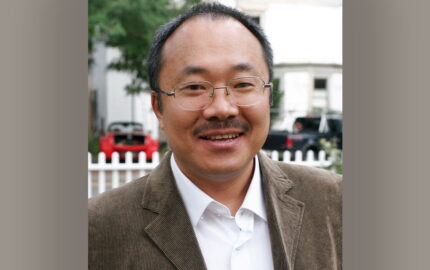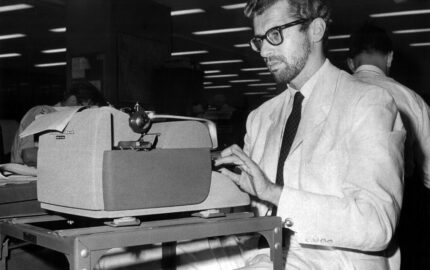CAMBRIDGE, Mass. (Dec. 30, 2000) — Lewis C. Clapp of Lexington, Mass. a pioneer in computer technology, died Saturday night, December 26, in Boca Raton Community Hospital in Florida after an operation for a ruptured appendix. He was 61 years old.
Over the decades, Clapp guided dozens of institutions, ranging from businesses to research groups to financial services into the information age. Educational institutions were a specialty. For the last eight years one of his clients was the Nieman Foundation at Harvard University, where he instructed hundreds of mid-career journalists on the technological mysteries of the information age. He was principal consulting partner at International Computer Research of Cambridge, a firm that specializes in interactive multi-media information systems.
With a beeper in his belt and a cellular phone in his bag, Lew Clapp was always ready to go wherever help was needed, answering many a late-night call to restore a crashed computer. But he viewed his role as far more than a technology advisor. He guided friends in finding the right dentist, in choosing a Chinese restaurant, in buying sneakers. As one co-worker said, he solved problems that people did not know they had.
Clapp was a consultant and developer of medical data systems for the New England Hemophilia Association at the Central Massachusetts Medical Center, Worcester, and the 13 regional hemophilia centers in New England. As a medical data consultant to the Joint Center for Radiation Therapy at the Harvard Medical School and Dana Farber Cancer Institute, Clapp developed a grant management and tracking system. He was also a lay member of a review board on research at Forsyth Dental Center. He was consultant on computer information systems for administration and education at the Museum School of the Boston Museum of Fine Arts and a member of the Board of Visitors.
Lewis Clapp was the co-founder of Tymeshare, Inc. the first independent national computer time sharing service in the United States, and served as executive vice president and a director when the company was listed on the New York Stock Exchange. He helped to establish the international communications system known as Tymenet. At Computer Research, Clapp conducted research studies for the Office of Naval Research where he was an early proponent of optical computing. He co-edited the MIT Press Book, "Electro-optical Information Processing." Clapp also conducted research for the consulting firm of Bolt Beranek and Newman, Inc. and Arthur D. Little Inc.
Clapp had long been actively engaged in computer education. Under sponsorship of the U.S. Office of Education and the Massachusetts Department of Education, Clapp conceived and developed the first federally funded state-managed computer education project in Massachusetts. He helped establish a computer time-sharing curriculum at the U.S. Naval Academy. He also taught computer science at the University of Chile in Santiago and served as Acting Director of the Computer and Servomechanism Laboratory in the Electrical Engineering Department at the School of Engineering. He developed computer computations for non-linear economic models for the Economic Commission for Latin America of the United Nations in Santiago.
He was a founder and publisher of Toy Review Magazine, a contributing science writer for the popular magazine International Science and Technology, and a co-editor of a special Sunday supplement on computer information technology published in The New York Times.
Born in Boston, Clapp received a bachelor's degree in physics and computer science from the Massachusetts Institute of Technology. He is also a graduate of Harvard University where he studied Japanese technology and governmental history and the Japanese language.
He is survived by his wife, Judith, his mother, Shirley Barrows of Canton, and three daughters, Sara of Santiago, Chile; Gabriella of New York and Susan of Boca Raton.
Over the decades, Clapp guided dozens of institutions, ranging from businesses to research groups to financial services into the information age. Educational institutions were a specialty. For the last eight years one of his clients was the Nieman Foundation at Harvard University, where he instructed hundreds of mid-career journalists on the technological mysteries of the information age. He was principal consulting partner at International Computer Research of Cambridge, a firm that specializes in interactive multi-media information systems.
With a beeper in his belt and a cellular phone in his bag, Lew Clapp was always ready to go wherever help was needed, answering many a late-night call to restore a crashed computer. But he viewed his role as far more than a technology advisor. He guided friends in finding the right dentist, in choosing a Chinese restaurant, in buying sneakers. As one co-worker said, he solved problems that people did not know they had.
Clapp was a consultant and developer of medical data systems for the New England Hemophilia Association at the Central Massachusetts Medical Center, Worcester, and the 13 regional hemophilia centers in New England. As a medical data consultant to the Joint Center for Radiation Therapy at the Harvard Medical School and Dana Farber Cancer Institute, Clapp developed a grant management and tracking system. He was also a lay member of a review board on research at Forsyth Dental Center. He was consultant on computer information systems for administration and education at the Museum School of the Boston Museum of Fine Arts and a member of the Board of Visitors.
Lewis Clapp was the co-founder of Tymeshare, Inc. the first independent national computer time sharing service in the United States, and served as executive vice president and a director when the company was listed on the New York Stock Exchange. He helped to establish the international communications system known as Tymenet. At Computer Research, Clapp conducted research studies for the Office of Naval Research where he was an early proponent of optical computing. He co-edited the MIT Press Book, "Electro-optical Information Processing." Clapp also conducted research for the consulting firm of Bolt Beranek and Newman, Inc. and Arthur D. Little Inc.
Clapp had long been actively engaged in computer education. Under sponsorship of the U.S. Office of Education and the Massachusetts Department of Education, Clapp conceived and developed the first federally funded state-managed computer education project in Massachusetts. He helped establish a computer time-sharing curriculum at the U.S. Naval Academy. He also taught computer science at the University of Chile in Santiago and served as Acting Director of the Computer and Servomechanism Laboratory in the Electrical Engineering Department at the School of Engineering. He developed computer computations for non-linear economic models for the Economic Commission for Latin America of the United Nations in Santiago.
He was a founder and publisher of Toy Review Magazine, a contributing science writer for the popular magazine International Science and Technology, and a co-editor of a special Sunday supplement on computer information technology published in The New York Times.
Born in Boston, Clapp received a bachelor's degree in physics and computer science from the Massachusetts Institute of Technology. He is also a graduate of Harvard University where he studied Japanese technology and governmental history and the Japanese language.
He is survived by his wife, Judith, his mother, Shirley Barrows of Canton, and three daughters, Sara of Santiago, Chile; Gabriella of New York and Susan of Boca Raton.


